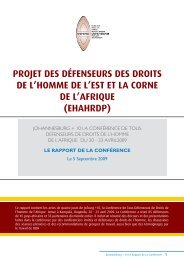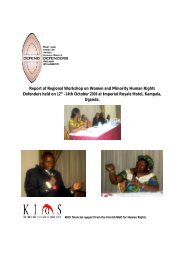Kutetea Haki za Binadamu - East and Horn of Africa Human Rights ...
Kutetea Haki za Binadamu - East and Horn of Africa Human Rights ...
Kutetea Haki za Binadamu - East and Horn of Africa Human Rights ...
Create successful ePaper yourself
Turn your PDF publications into a flip-book with our unique Google optimized e-Paper software.
policy towards human rights defenders. EU Missions should therefore seek to adopt a proactive policy<br />
towards human rights defenders. They should at the same time be aware that in certain cases EU action<br />
could lead to threats or attacks against human rights defenders. They should therefore, where appropriate,<br />
consult with human rights defenders in relation to actions which might be contemplated. If action is taken<br />
on behalf <strong>of</strong> the EU, EU Missions should provide feedback to human rights defenders <strong>and</strong>/or their families.<br />
Measures that EU Missions could take include:<br />
preparing local strategies for the implementation <strong>of</strong> these guidelines, with particular attention to<br />
women human rights defenders. EU Missions will bear in mind that these Guidelines cover human<br />
rights defenders who promote <strong>and</strong> protect human rights, whether civil, cultural, economic, political or<br />
social. EU Missions should involve human rights defenders <strong>and</strong> their organisations in the drafting <strong>and</strong><br />
monitoring <strong>of</strong> local strategies;<br />
organising at least once a year a meeting <strong>of</strong> human rights defenders <strong>and</strong> diplomats to discuss topics<br />
such as the local human rights situation, EU policy in this field, <strong>and</strong> application <strong>of</strong> the local strategy for<br />
implementing the EU Guidelines on human rights defenders;<br />
coordinating closely <strong>and</strong> sharing information on human rights defenders, including those at risk;<br />
maintaining suitable contacts with human rights defenders, including receiving them in Missions <strong>and</strong><br />
visiting their areas <strong>of</strong> work; consideration could be given to appointing specific liaison <strong>of</strong>ficers, where<br />
necessary on a burden-sharing basis, for this purpose;<br />
providing, as <strong>and</strong> where appropriate, visible recognition for human rights defenders <strong>and</strong><br />
their work, through appropriate use <strong>of</strong> the media – including the internet <strong>and</strong> new information <strong>and</strong><br />
communication technologies – publicity, visits or invitations for such purposes as presenting prizes they<br />
have obtained;<br />
where appropriate, visiting human rights defenders in custody or under house arrest <strong>and</strong> attending<br />
their trials as observers.<br />
Promoting respect for human rights defenders in relations with third countries<br />
<strong>and</strong> in multilateral fora<br />
12. The EU’s objective is to influence third countries to carry out their obligations to respect the rights <strong>of</strong><br />
human rights defenders <strong>and</strong> to protect them from attacks <strong>and</strong> threats from non-State actors. In its contacts<br />
with third countries, the EU will, when deemed necessary, express the need for all countries to adhere to<br />
<strong>and</strong> comply with the relevant international norms <strong>and</strong> st<strong>and</strong>ards, in particular the UN Declaration. The<br />
overall objective should be to bring about an environment where human rights defenders can operate<br />
freely. The EU will make its objectives known as an integral part <strong>of</strong> its human rights policy <strong>and</strong> will stress the<br />
importance it attaches to the protection <strong>of</strong> human rights defenders. Actions in support <strong>of</strong> these objectives<br />
will include the following:<br />
where the Presidency or the High Representative for the Common Foreign <strong>and</strong> Security Policy or the<br />
Personal Representative <strong>of</strong> the SG/HR on <strong>Human</strong> <strong>Rights</strong> or EU Special Representatives <strong>and</strong> Envoys or<br />
representatives <strong>of</strong> the Member States or the European Commission are visiting third countries, they<br />
will, where appropriate, include meetings with human rights defenders during which individual cases<br />
<strong>and</strong> the issues raised by the work <strong>of</strong> human rights defenders are addressed, as an integral part <strong>of</strong> their<br />
visits;<br />
the human rights component <strong>of</strong> political dialogues between the EU <strong>and</strong> third countries <strong>and</strong> regional<br />
organisations, will, where relevant, include the situation <strong>of</strong> human rights defenders. The EU will<br />
underline its support for human rights defenders <strong>and</strong> their work, <strong>and</strong> raise individual cases <strong>of</strong> concern<br />
whenever necessary. The EU will be careful to involve human rights defenders, under the most<br />
appropriate arrangements, in the preparation, follow-up <strong>and</strong> assessment <strong>of</strong> the dialogue in accordance<br />
with the EU Guidelines on human rights dialogues;<br />
56<br />
<strong>Kutetea</strong> <strong>Haki</strong> <strong>za</strong> <strong>Binadamu</strong>: Kitabu cha Marejeo kwa watetezi wa <strong>Haki</strong> <strong>za</strong> <strong>Binadamu</strong> | Toleo la pili








